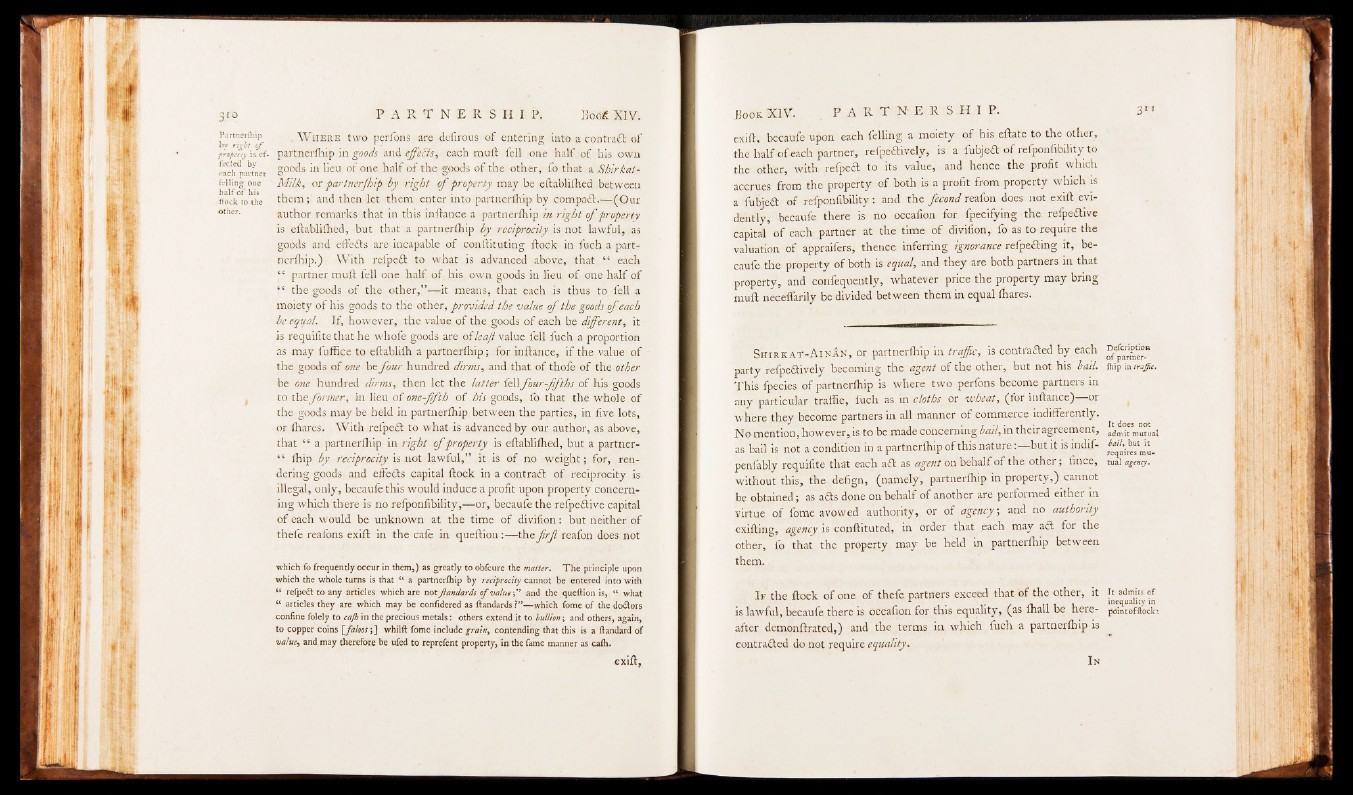
Partnerlhip
by right o f
property is. effected
by
each partner
felling one
half of his
flock to the
other.
. W h e r e two perfens are defirous of entering into a contrail: of
partnerlhip in goods and cjfcBs, each mu ft fell one half of his own
goods in lieu of one half of the goods of the other, fo that a Shirkat-
Milk, or partnerjhip by right o f property may be eftablilhed bet ween
them; and then let them enter into partnerlhip by compadh— (Our
author remarks .that in this inftance a partnerlhip in right o f property
is eftablilhed, but that a partnerlhip by reciprocity is not lawful, as
goods and effedts are incapable of conftituting ftock in fuch a part-
nerlhip.) With refpedt to what is advanced above, that “ each
“ partner muft fell one half of. his own goods-in lieu of one half of
“ the goods of the other,”— it means, that each is thus to fell a
moiety of his goods to the other, provided the value o f the goods o f each
be equal. If, however, the value of the goods of each be different, it
is requilite that he wbofe goods are oileaft value fell fuch a proportion
as may fuffice to eftablilh a partnerlhip; for inftance, if the value of
the goods of one be four hundred dirms, and that of thofe of the other
be one hundred dirms, then let the latter fell four-ffths of his goods
to the former, in lieu of one-fifth of his goods, lo that the whole of
the goods may be held in partnerlhip between the parties, in five lots,
or lhares. With refpedt to what is advanced by our author, as above,
that “ a partnerlhip in right o f property is eftablilhed, but a partner-
“ lhip by reciprocity is not lawful,” it is of no weight; for, rendering
goods and effedts capital ftock in a contract of reciprocity is
illegal, only, becaufe this would induce a profit upon property concerning
which there is no refponfibility,— or, becaufe the relpedtive capital
of each would be unknown at the time of divilion: but neither of
thele reafons exift in the cafe in queftion:— the firfi reafon does not
which fo frequently occur in them,) as greatly to obfcure the matter. T h e principle upon
which the whole turns is that “ a partnerlhip by reciprocity cannot be entered into with
“ refpedt to any articles which are not Jlandards o f v a l u e and the queftion is, “ what
(t articles they are which may be conftdered as ftandards ?”— which fome of the dodtors
confine folely to cajh in the precious metals: others extend it to bullion; and others, again,
to copper coins [ faloo s; ] whilft fome include grain, contending that this is a ftandard of
value, and may therefore be ufed to reprefent property, in the fame manner as calh.
exift, becaufe upon each felling a moiety of his eftate to the other,
the half of-each partner, refpedtively, is a fubjedt of refponfibility to
the other, with refpeft to its value, and hence the profit which
accrues from the property of both is a profit from property which is
a fubjedt of refponfibility: and the fecond reafon does not exift evidently,
becaufe there is no occafion for fpecifying the relpedtive
capital of each partner at the time of divifion, fo as to require the
valuation of appraifers, thence inferring ignorance refpedting it, becaufe
the property of both is equal, and they are both partners in that
property, and confequently, whatever price the property may bring
muft neceffarily be divided between them in equal lhares.
S h i r k a t - A i n a n , or partnerlhip in traffic, is contr'adted by each
party refpedtively becoming the agent of the other, but not his bail.
This fpecies of partnerlhip is where two perfons become partners in
any particular traffic, fuch as in cloths or wheat, ( ior inftance) or
Where they become partners in all manner of commerce indifferently.
No mention, however, is to be made concerning bail, in their agreement,
as bail is not a condition in a partnerlhip of this nature:— but it is indif-
penfably requilite that each aft as agent on behalf of the other; fince,
without this, the defign, (namely, partnerlhip in property,) cannot
be obtained; as adts done on behalf of another are perfoi med eithei in
virtue of fome avowed authority, or of agency, and no authority
exifting, agency is conftituted, in order that .each may adt for the
other, fo that the property may be held in partnerlhip between
them.
If the ftock of one of thefe partners exceed that of the other, it
is lawful, becaufe there is occafion for this equality, (as lhall be hereafter
demonftrated,) and the terms in which fuch a partnerlhip is
contradted do not require equality.
Delcriptiou
of partnerlhip
in traffic.
It does not
admit mutual
bail, but it
requires mutual
agency.
It admits of
inequality in
pdint of ftock*.